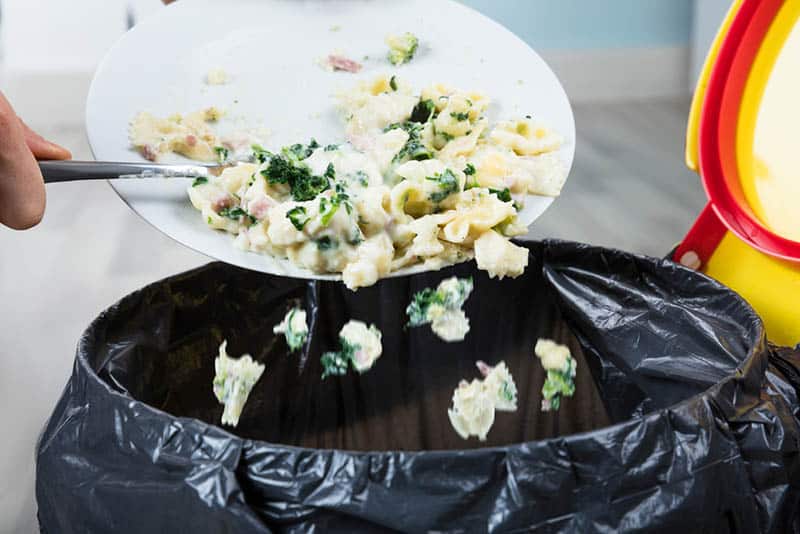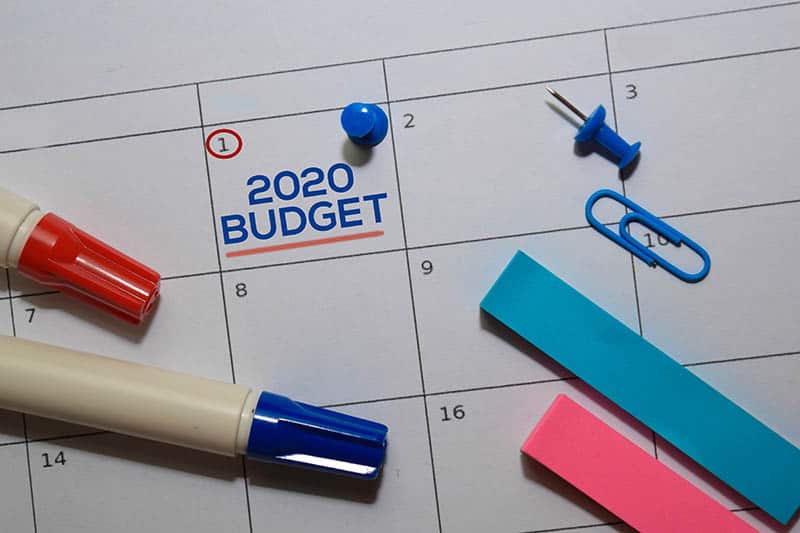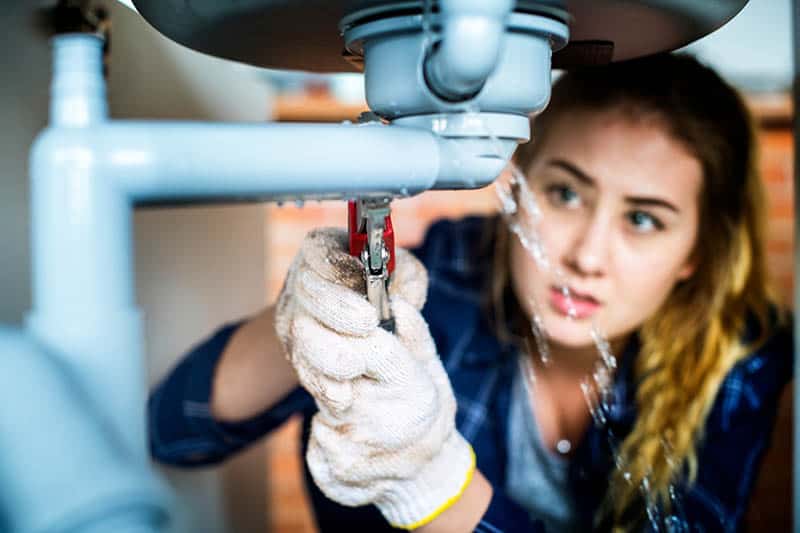Somehow, you feel you are not spending much, so you keep wondering where your money goes.
You don’t pay income tax or daycare expenses, maybe you try so much to avoid lavish spending and live within your means, but you still don’t have much in your bank account to show for it.
It may interest you to know that your money keeps slipping out through the tiny leaks in your budget.
Most times, people don’t realize how much they spend on all the small stuff.
You may feel your money keeps disappearing because you don’t remember any major expense.
It is crucial to categorize your expenses and find out where your money goes in order to gain control over your financial situation.
When you realize the exact items you spend on each month, you will find the leaks through which your money disappears.
Take a look at these budget leaks to help you answer the question, where did my money go?
1. Disposable Products

If you are staying at home and you keep using disposable products like paper plates, diapers, and paper towels for convenience sake’s that’s a leak right there.
It’s just like throwing away cash.
You can save yourself some money by using dishwasher safe plates and cups instead of the paper version.
You can also leave out paper towels and use reusable water bottles instead of disposable water bottles.
Also, try using cloth diapers instead of disposables.
By using disposables, you save yourself the time you would ordinarily spend in washing dishes and towels and napkins; however, the cost of buying these products time and time over, adds up to a lot of money.
2. Trashing Food

Do you buy more food than you need and end up throwing it out as it spoils? That’s a big budget leak.
Throwing out food doesn’t just mean one less meal for you; it also means less money.
Think about how much food you wasted in the last month. That should add up to a lot of money!
If you let groceries go bad without consuming them, you are simply throwing money in the trash.
Find out what you need before you shop, so you don’t buy in excess. If you have to store food, do it the right way.
Try out meal planning. Avoid wasting food to save yourself some money.
3. Formula

Some of your disappearing cash goes into buying formula.
Breastfeeding is the least expensive way to feed your baby and it can save you money. For stay-at-home moms, it may be more convenient to breastfeed exclusively.
However, not all moms can breastfeed exclusively. Some moms feed their babies both formula and breast milk.
Others breastfeed for several months and then switch to formula. Whatever the case, you can still save money.
Consider buying powdered formula which is much less costly than ready-to-use and liquid concentrate.
You can also try cow’s milk formula which is often less expensive than soy formula unless your pediatrician says you shouldn’t.
Consider generic formulas instead of brand-name formulas since they have similar quality and nutritional standards. Also, buy in bulk to save more money.
4. Clothes

If you are spending a lot of money on clothes when you don’t have to keep up appearances at work every day, that’s one leak.
You need to decide if spending so much money on clothes is a priority for you. As a stay-at-home mom, you should spend less on clothes.
You can dress a little more casually and save on clothing. That way, you won’t need to think about “where did my money go” so often.
But since most women like to have new things every once in a while, check out the secondhand clothing shops in your area.
Many of the items still have their tags on them…but at way cheaper prices.
5. Convenience Foods

Extra charges from purchasing convenience foods also cut a hole in your purse.
If you buy already peeled and chopped vegetables or fruits from the grocery store; or buy water or soda bottles at gas stations, drug stores, or convenient stores; or make your purchases from vending machines, you could be paying at least twice for convenience.
You can save so much money with only a little bit of forward thought, and of course, preparation.
When next you are buying groceries, buy a pack of smaller-sized soda bottles, and place the bottles in your fridge.
Then when you go out, throw one of these smaller bottles into your bag.
By investing a little more time in minor jobs such as peeling and chopping your fruits and vegetables, you get to save more money.
6. Paying More for Services

You may be overpaying for services you don’t try to negotiate prices for. More than you realize, a lot of things out there are quite negotiable.
Try to compare prices, and look out for better deals to cut costs.
Depending on where you live, check for different rates and negotiations for electricity, cable, cell phone provider, credit card interest rate, and insurance.
7. Pet Expenses

Payments for veterinary care, vaccinations, and food for your pet also adds up to lots of money.
However, having these pet expenses is a choice; you may have to give up something else to save for your pet budget.
8. Habits

Habits like drinking, smoking, and gambling can cost you quite a lot.
There is the cost of purchasing cigarettes and drinks which can add up quickly. Gambling also affects your finances over time.
It is crucial to check from time to time how much we spend on these habits.
You might want to consider dropping some habits to save your finances.
9. Avoidable Fees

The interest you pay for the late payment of bills is also a huge leak.
RELATED: How to Budget When You Are Behind on Bills: A Detailed Guide
You just keep making the banks richer with the interest you pay on loans, credit card debts, or mortgages.
Have a look at your mortgage statements or your credit card bills to have an idea of how much you spend in paying off interest.
Make a serious effort to pay off debts as fast as you can to minimize the amount of interest you will have to pay cumulatively.
10. Impulse Purchases

Purchasing items you never planned to buy probably because the deal looks too good to pass up is a spending leak.
You are simply spending money you wouldn’t have spent otherwise.
Impulse buying can make you buy stuff you don’t need and will likely not use.
You probably didn’t think much before making the purchase, so it would be fair to say that you do not need the item and will discard it soon.
You need to stop adding extra items to your shopping cart as you might be throwing away so much money by making that purchase.
Stick to your grocery list and you won’t have problems with the “where did my money go” issue.
11. Going After Brand Names

Buying strictly the brand name of everything can cost you more than you need to spend.
You can try generic products sometimes since they are often of similar quality but without the high marketing budgets or fancy packaging.
When you buy generic brands, you are not actually giving up quality or taste. Sometimes the generic and the brand-name product could be the exact same thing.
You should be willing to try the generic products out. This way, you can also save some money.
12. Eating Out

When it comes to eating out, small expenses can add up really fast.
Calculate how much you have spent eating out in the previous month, and you will realize just how much you overspend on food.
Eating out may be a hard habit to break; however, it is a budget drainer.
With the excuse of needing food to survive, it is easy to spend so much on food.
If you have a habit of eating out, you might find yourself trapped in the biggest spending leak.
Also, if you have a growing family, then you should start eating at home more often.
The good news is that you can make almost everything at home. You get to save more simply by preparing more of your meals.
You can cut your costs and save on food by creating your own monthly meal planner.
Cooking with your kids can also turn out to be so much fun, plus home-prepared foods tend to be healthier than the typical restaurant meals.
You can also cut costs by avoiding convenience foods and instead, make your own meals from scratch for a fraction of the cost.
The next thing you need to do after locating the leaks in your budget is to fix them. You can achieve this by making small changes to your habits.
Also, you need to adopt some saving tips which will help you keep a successful budget.
Money-saving tips for stay-at-home moms are essential to help moms break free from costly routines. Moms need to be smart about money.
Some of the tips that can help you save money as a stay-at-home mom include:
Tip 1: Make a Budget

Learning to make budgets is crucial if you want to get ahead financially.
A budget helps you plan for every expense in advance. If you are living without a budget, then you are certainly overspending.
You need a working monthly budget to help you stop cutting into your savings each month.
A budget calendar gives every dime a place to go and keeps you in charge of your money. If you don’t have one yet, make one now.
Also, you need a level of self-control to stick to the budget.
It will help if you constantly remind yourself that every dollar has been cut out for something important already and shouldn’t go toward something else.
Tip 2: Stay at Home
If you want to save money as a stay-at-home mom, then you would actually have to stay at home.
Schedule playdates at home rather than spending money taking the kids out.

Going out will require spending on transportation—either gas for your car or fares for busses and trains.
Turno your home into a play area and show the kids that they can have fun at home.
If you have a hobby that involves going out and spending money, for example, shopping, then you would need to get a new one.
Try something else that doesn’t require spending like helping in your local school or reading.
Tip 3: Learn Basic Skills to Help You Save Money
It’s great to pick up a few skills that can help you save some money in the house.
It won’t take you much since you only need to watch a couple of videos to get a hang of how it’s done.
You can learn and try practicing how to use the clippers.
You get to save money from cutting your kid’s hair at home whenever he needs a haircut, instead of going to pay for a haircut every time.
Also, you can do your manicures and pedicures, and dye your hair too. You can save enough money for other things this way.

Tip 4: Try Buying Used Clothes
Kids grow quickly and can outgrow their clothes so fast. You can try buying second-hand clothes which are quite economical.
Buying used clothes whenever possible is an excellent way to spend less on kids clothes and save more.
Many people around you may just want to get rid of extra clothing so you can find some great deals.
You can also check second-hand retail stores for kids specifically, as well as mom-to-mom sales at churches and schools.

Tip 5: Learn to Do Your Repairs
You don’t need to hire a pro to do all your repairs for you. You can save some money if you learn to do basic repairs yourself.
For instance, you can fix or replace a broken toilet lever. It’s pretty easy to do.
You can also sew and mend tears. If you learn how to fix a seam, sew on a button, mend a hem or apply a patch, you can greatly reduce the amount you spend on clothing repairs (or new clothes purchases) which is good for your wallet.

Tip 6: Don’t Go to the Store with Kids
You are likely to spend more if you take your little ones along when going to the store.
They do not understand how important it is to get the needs first before wants.
Kids can ask for everything they see and can pout all day or even throw tantrums if you don’t get it for them.
If you want to save money, you should avoid buying all the little toys at the store by not going to the store with your little ones; instead, stick to your list and save your money for items they need.

Tip 7: Control the Toothpaste
For kids under the age of six, the toothpaste container clearly states a pea size amount only. Kids might want to squeeze out more than that.
If you let your kids do their toothpaste all the time, they might squeeze out so much that you would need to buy a new tube every week.
By controlling the toothpaste, you get to maximize use and save money.

Tip 8: Limit Text Messages
The most expensive feature on your cell phone is text messaging.
Instead of texting, you can save costs by calling or sending an e-mail from your home computer, or you can use the chat feature on Facebook.

Tip 9: Shop with a Grocery List
You might go to the store with the intention of purchasing just a few things, but you end up buying so many items which you saw and suddenly felt like buying.
You get so carried away with this that most times, you end up leaving out the important items that made you go to the store in the first place.
Making a list of what you need to buy at the grocery store will help you check purchases of items you don’t need.
Also, sticking to the list will help you avoid impulse buying.
A shopping list is an incredibly vital resource to help you save both time and money. With a list, you know exactly what you need, so you move straight to it and pick it up.

Tip 10: Shop with Cash
When next you go to the store, use cash for payment as much as possible.
People who pay with cash are likely to spend less than those who pay with cards.It makes a more significant impression to hand over cash and see it disappear than just swiping a card.
Also, you can check impulse purchases by carrying only the amount you need to shop with, in cash, to the store, and leaving your cards behind.

Tip 11: Cancel Memberships You Don’t Use
There is no point in keeping a membership you don’t use.
Check your credit card statement and your bank account for monthly or yearly charges you do not utilize and cancel them.
Even if you intend to go back to it later, cancel it until you are ready.

Tip 12: Find Free Events for Entertainment
There is room for you to have fun without spending much.
Find free arts and craft shows, holiday activities, and concerts around you.
Consider going to the park, too. The library is also a great resource.
You can make the most of what you have without having to spend tons of money.
Resist the urge to spend when you can have all the fun for free.

Tip 13: Live Within Your Means
When you make your budgets, do not be tempted to spend more than you make. Adopt a frugal lifestyle instead,
Keep your possessions few, your distractions minimal, and your meals simple. Learn contentment.
The key to happiness is being contented with the much you have now and not thinking that you need more to make you complete.

Tip 14: Pick up a Side Hustle
Depending on your schedule, you may be able to put in a few hours of work every day to make extra money.
There are various jobs you can do from home which include, freelance writing and editing, consulting, telemarking, and sales, etc.
You can also provide childcare for other working parents.
If you feel you can handle taking care of another child in addition to yours, you should consider becoming a childcare provider or daytime babysitter.
Who is in a better position to watch someone’s child than an experienced mom?
You may also want to consider starting up a business. Find out what your talent is and get to work. It could be online marketing, crafting, or IT.
You can take on projects or clients as your schedule allows.
RELATED:
- Make $50 A Day While Being A Stay At Home Mom: 21 Amazing Tips
- How To Afford To Be A Stay At Home Mom: 18 Useful Tips
There are some additional step guide that could help you save money as a stay-at-home mom.
They will be discussed in the remaining part of this article.
When it comes to money and spending, moms really need to be smart.
What you need to do is to firstly, identify what drives your financial decisions. Understanding your priorities will help you get started.
Also, take time to manage your money. Create a financial planning habit in your routine.
That would be time for you to think and talk about how best to manage your money.
You probably have an idea of where your money goes from the budget leaks discussed earlier.
After identifying these leaks, work out ways to plug them by applying the tips provided.
Start shopping smarter, too. We discussed earlier how you could waste a lot of money on shopping.
See how many of the shopping tips you can incorporate into your spending in the next month.
Draft a plan to reduce debt. Your total debt shouldn’t be more than 20 percent of your net income.
Don’t allow your debt to devastate and paralyze you. Try combining money management with debt management techniques to reduce your debt.
RELATED: Mistakes When Getting Out of Debt: 9 Mistakes To Avoid
A strong credit report is also essential.
You should make an effort to build a strong one. Pay off your debts on time, and check your credit report to make sure it is error-free.
Also, saving money is essential to securing your future. If you do not have a saving habit already, you should begin today.
Decide how much you would save every month, and automate the transfer of that amount to your savings account. The earlier you start, the better.
Set S.M.A.R.T. financial goals.
After writing down your goals, divide them into short-term, medium-term, and long-term categories.
Make sure the goals are specific, measurable, achievable, realistic, and timely. Also, check your priorities when setting your goals.
In addition, make investments to reach your goals.
Investment is one of the best ways to watch your money grow, especially when you are putting money aside for long-term objectives.
Identify what you are saving for and know how long it will take you to get there.
READ NEXT: Saving Money Motivation: 10 Tips to Reach Your Savings Goals
Like this article? Please share or pin it for later. You can also stay in the loop and follow us on Facebook, Instagram and Pinterest.

This post contains affiliate links. Please see our full disclosure for more info.

